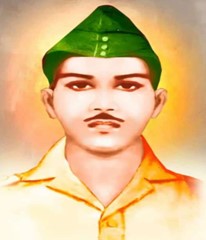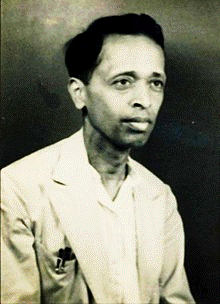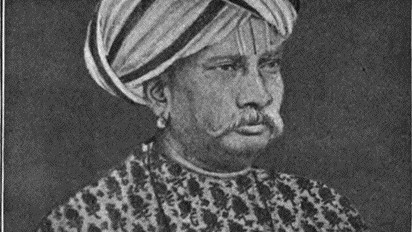PREVIOUS
Freedom Fighters from Tamil Nadu Part – 12
Freedom Fighters from Tamil Nadu Part – 12
(இதன் தமிழ் வடிவத்திற்கு இங்கே சொடுக்கவும்)
59. Vattakudi Iraniyan
Early Life and Background
- Vattakudi Iraniyan born on 15 November 1920 in Vaattakudi Village, Tanjore District, Tamil Nadu.
- He was originally named Venkatachalam.
- He moved to Malaysia for work, where he was radicalized and adopted the name 'Iraniyan.'
Contribution to the Freedom Movement
- Iraniyan was actively involved in the Indian National Army led by Subhas Chandra Bose and later became a militant organizer for landless peasants upon returning to Tanjore.
- He fought against the landlords, including those from his own caste.
Imprisonment and Death
- During a crackdown by the Congress government in the Madras Presidency, Iraniyan went into hiding but was eventually captured by the police.
- In May 1950, he and three comrades were shot dead.
- A monument was later erected in his honor by the Communist Party of India (CPI) in Pattukkottai, Tanjore.
Death
- Vattakudi Iraniyan passed away on 5 May 1950.

60. Mandayam Parthasarathi Tirumal Acharya
Early Life and Background
- Born on April 15, 1887, in Triplicane, Madras, Mandayam Parthasarathi Tirumal Acharya came from a family of Aiyangar Brahmins.
- His father, M.P. Narasimha Aiyangar, was an employee in the Madras Public Works Department.
Early Activism and the Launch of ‘India’
- At age 19, M.P.T. Acharya, alongside Subramanya Bharathi, co-founded the weekly nationalist journal ‘India’ in 1906.
- The publication aimed to promote Indian nationalist sentiments and was known for its critical editorials and satirical cartoons.
Relocation to Pondicherry
- The British colonial authorities, alarmed by the journal’s seditious content, forced M.P.T. Acharya and Bharathi to relocate to the French enclave of Pondicherry.
Revolutionary Activities in Pondicherry
- In Pondicherry, M.P.T. Acharya continued his revolutionary work by expanding the press to include publications of revolutionary literature.
- The British government sought French assistance to suppress these publications, labeling them as seditious.
- Under British pressure, French authorities in Pondicherry allowed the establishment of surveillance centers by the Indian Imperial Police to monitor revolutionary activities.
Challenges and Exile
- During this period, efforts were made to extradite Indian revolutionaries to British custody.
- M.P.T. Acharya, Bharathi, and other associates, including S.N.T. Acharya and his cousin, were forced to flee to Europe.
Support and Legal Battles
French Legal Assistance
- Despite facing resistance, M.P.T. Acharya and other refugees received support from French lawyers who helped them fight against expulsion from Pondicherry.
Activism in Europe
Journey to Europe
- Acharya travelled to Europe, starting with Colombo and proceeding to Marseilles, before settling in Paris.
Involvement with India House
- In Paris, M.P.T. Acharya connected with V.V.S. Iyer, an Indian barrister associated with India House in London.
- M.P.T. Acharya moved to London, where he engaged with India House and its nationalist activities, meeting prominent figures like V.D. Savarkar.
Role in World War I
- During World War I, M.P.T. Acharya was involved in the Hindu-German Conspiracy and the Berlin Committee, working with Har Dayal to establish the Indian Volunteer Corps with Indian POWs.
Founding the Communist Party of India
- After the war, M.P.T. Acharya moved to the Soviet Union and was a founding member of the Communist Party of India in Tashkent.
Engagement with International Movements
- Returning to Europe, M.P.T. Acharya participated in the League Against Imperialism and engaged with the international anarchist movement.
Later Life and Legacy
- M.P.T. Acharya continued his activism across various continents until his death on March 8, 1954, at Pattiya.

61. Gazulu Lakshminarasu Chetty
Early Life and Background
- Gazulu Lakshminarasu Chetty was born in 1806 in Madras, Tamil Nadu, to Sidhulu Chetty, a wealthy indigo merchant.
- Raised in a prosperous family, Gazulu Lakshminarasu Chetty received an initial education that set the foundation for his future endeavors in business and politics.
- Following his education, Gazulu Lakshminarasu Chetty joined the family trade and achieved success as a businessman.
- His wealth and influence allowed him to venture into political and social causes.
Political and Social Activism
Opposition to Christian Missionaries
- In the mid-19th century, Christian missionaries were actively proselytizing in public institutions in the Madras Presidency, reportedly with the support of British officials.
- This preference for native Christians in higher appointments was perceived as a strategy to convert Hindus to Christianity.
- Gazulu Lakshminarasu Chetty, a staunch defender of Hindu interests, opposed these missionary activities and criticized the British government's partial stance.
Founding of ‘The Crescent’
- On October 2, 1844, Gazulu Lakshminarasu Chetty founded ‘The Crescent’, the first Indian-owned newspaper in the Madras Presidency.
- The newspaper aimed to improve the condition of Hindus and address issues arising from government policies.
- However, from its inception, ‘The Crescent’ faced strong opposition from the government.
Campaign Against Property Rights Legislation
- The British government proposed a law allowing Hindu converts to Christianity to retain ancestral property rights, a move that was heavily criticized by the Hindu community.
- Under Gazulu Lakshminarasu Chetty’s leadership, Hindus in Madras presented a memorial to the Governor on April 9, 1845, condemning the proposal.
- The government eventually withdrew the legislation after prolonged discussions with the agitators.
Educational Reforms and Protests
Opposition to Christian Theology in Education
- The Madras government attempted to introduce the Bible as a standard textbook and made knowledge of Christian theology a requirement for government posts.
- This move was met with strong resistance from the Hindu community.
- On October 7, 1846, Gazulu Lakshminarasu Chetty presided over a protest meeting at Pachaiyappa's College, where a memorandum was sent to the Court of Directors of the British East India Company.
- The protest was successful, and the initiative to include Christian theology in the curriculum was abandoned.
Further Educational Reforms
- In 1853, the government made another attempt to include the Bible in the educational curriculum.
- Gazulu Lakshminarasu Chetty, along with George and John Bruce Norton, actively opposed this measure.
- Their combined efforts led to the failure of this initiative as well.
Legacy and Death
- Gazulu Lakshminarasu Chetty's activism played a crucial role in defending Hindu interests and resisting colonial attempts to impose Christian influences in education and property rights.
- His work in founding ‘The Crescent’ and his leadership in social and political protests left a lasting impact on the Hindu community in the Madras Presidency.
Death
- Gazulu Lakshminarasu Chetty passed away in 1868.

62. R.S. Venkatarama Iyer
Early Life and Education
- R.S. Venkatarama Iyer was born in July 1886 in Madurai, Tamil Nadu, to Sundararama Iyer.
- His was proficiency in multiple languages, including Tamil, Telugu, Kannada, Hindi, and English.
Early Involvement in the National Movement
- Even as a student, Venkatarama Iyer actively participated in the Home Rule Movement.
- His involvement in nationalist activities began at a young age, showcasing his commitment to India’s independence.
Contributions to the Freedom Movement
Oratory and Propaganda
- Known for his eloquence, Venkatarama Iyer was a powerful orator who effectively propagated the national movement in the villages around Madurai.
- His fearless and brave stance earned him the nickname “Mattaparai singam” (Lion) among the people.
Untouchability and Prohibition Movements
- Venkatarama Iyer was a staunch advocate of social justice and worked actively on the Untouchability Movement and the Prohibition Movement in Madurai.
- His efforts to address social issues and promote reform were integral to his activism.
Major Political Activities and Imprisonments
Surat Congress Session (1906)
- In 1906, Venkatarama Iyer participated in the Surat Congress session alongside other prominent leaders like Subramanya Bharathi and V.O. Chidambaram Pillai.
Non-Cooperation Movement (1921)
- In 1921, Venkatarama Iyer joined the Non-Cooperation Movement, which led to his imprisonment for one year.
Salt Satyagraha (1930)
- Venkatarama Iyer took part in the Salt Satyagraha in 1930, demonstrating his commitment to Gandhi’s call for civil disobedience against British salt laws.
- He gathered substantial support and actively participated in the movement.
Civil Disobedience and Imprisonment (1931)
- As the Dindigul district president of the Congress in 1931, he was arrested and imprisoned for two years due to his involvement in the Civil Disobedience Movement.
Congress Convention (1937-1938)
- In 1937, Venkatarama Iyer successfully organized the Congress Convention at Vethalagundu.
- He was elected as an MLA in 1938, further solidifying his role in the political landscape of the time.
Legacy and Death
- R.S. Venkatarama Iyer passed away in May 1957.
-------------------------------------


